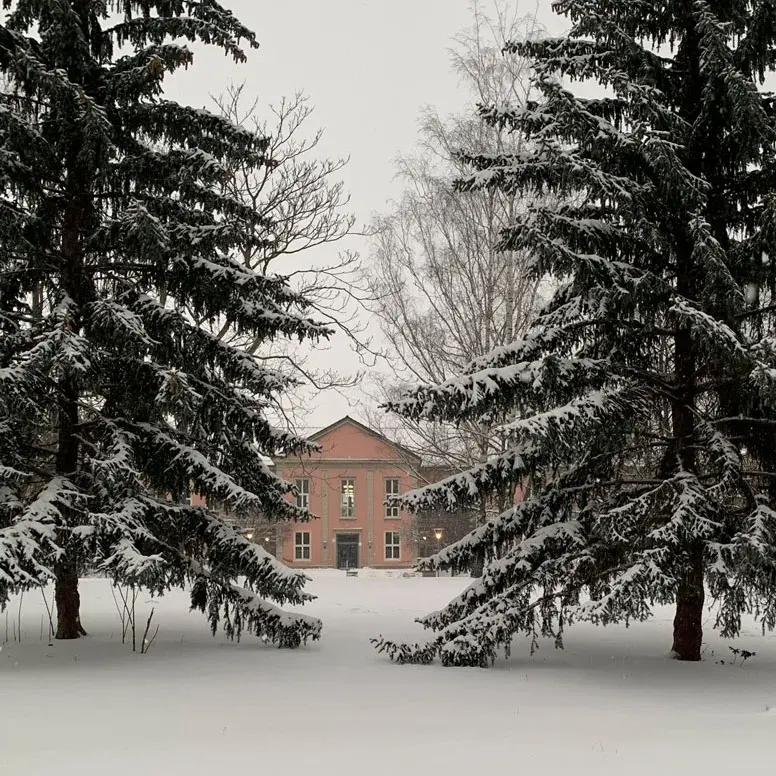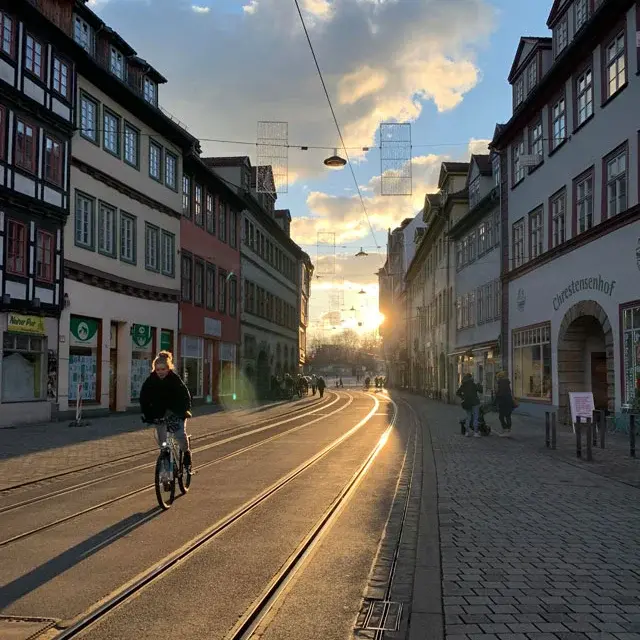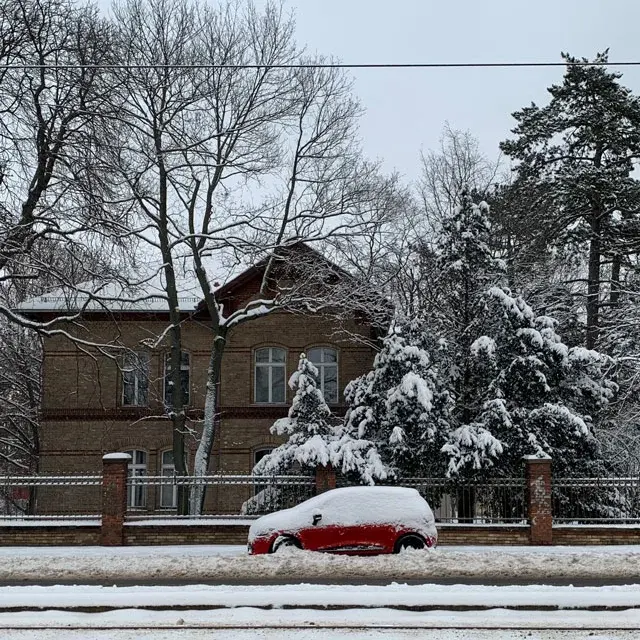"A wide spectrum of emotions"
![[Translate to English:] [Translate to English:] Vedika from India](/fileadmin/_processed_/c/e/csm_Bin_dann_mal_da_Vedika_engl_6c83bc9f31.webp)
Moving from India to Germany: By Vedika Singhania
“But Germany has a better healthcare system.”
I presented my first defence to get my parents’ consent to let me uproot my life in the middle of a pandemic and move to another country whose language I didn’t speak. My acceptance letter for a Master’s programme had just arrived, and the semester was due to begin in October 2020. We were, at the time, witnessing an all-time high spike in COVID-19 cases across the world, especially in Italy. India too was slowly but steadily climbing up the rankings of the most affected countries in the world.
My parents were not convinced with my argument — Italy was so close to Germany — but they agreed anyway. Little did I know, convincing them would be the easiest part of the entire process.
The Preparations
I immediately started looking for accommodation in one of the student dorms on campus, keeping in mind that visa procedures could delay my arrival. I was still optimistic.
We never had Wi-Fi at home growing up. So even after my siblings and I moved back home, which is in a small city in Eastern part of India, at the beginning of March, we still thought that the pandemic was a brief disruption and we’d soon move back to our metropolitan cities and resume our ‘normal’ lives stable and unlimited internet connections. I had quit my job at a news agency in New Delhi in December 2019, and had started looking at public colleges to pursue higher studies. As soon as the lockdown was announced, the education consultancy services stopped functioning briefly, and I was left on my own. As the days turned to weeks, and weeks into months, our parents strongly urged us to get Wi-Fi installed.
Anyway, the biggest challenge after securing admission was to get a visa appointment. Most of the consulates were operating with a skeleton staff. My family had exhausted all our ‘connections’. The Kolkata consulate office too was unpredictable, and released limited slots erratically. I met a bunch of other students on Facebook groups, who like me were trying to secure a slot, but we were met with ‘Please check the website for updates’, and therefore, we all stayed glued to our screen for a few weeks in a state of desperation.
Sometimes, they couldn’t fathom why I would put myself through all the trouble when I could have had an easy life by getting married instead.
My university’s enrolment date was nearing and my college offered a choice to defer. Considering the rising number of COVID cases, I reluctantly considered it as an option. We were also moving out from my ancestral house at the time, and the construction of our new house was underway. My parents could only offer moral support now. On some nights, seeing me awake late at night, refreshing the consulate website for updates, my father would ask me if I still wanted to go abroad. It was a foreign concept in my family for anyone to go out of the country for education. Initially I was left alone to defend my decision, but over time, my parents succumbed to my determination and stubbornness, and started helping me hold fort too. Seeing me in this state of despair again, their skepticism too started showing once again. Sometimes, they couldn’t fathom why I would put myself through all the trouble when I could have had an easy life by getting married instead.
One fine night in the last week of September, at 1.30 am, the consulate released a fresh batch of visa appointment slots for Master’s students, a whole lot of them. My orientation week was in the last week of October. It was apparent that the embassy was still not completely functional, and would not return my stamped visa on time. But the situation in Germany seemed better: the universities had employed a hybrid method of teaching and I was expecting to make up for the lost time, and meet my batch mates once I reached there, albeit slightly later than expected.
There was a sense of uncertainty and unpredictability looming over us.
My visa arrived in the second week of November; we had already moved into our new house. We rented a car, so my family could drop me to the Kolkata airport. It would be a nearly two-day journey, halting at various airports, changing trains and trams. My family would be with me only on the first six hours of this journey.
Two nights before we were scheduled to leave, my mother developed a throat infection. It was a mild one, but we got tested for COVID anyway. It got worse later in the evening, so at midnight, we decided that she wouldn’t accompany us. I snuggled with my mother that night, crying my eyes out, ruing the six hours of lost time with her. My brother would stay behind too.
One night before I was to leave, my father, while packing as many spices as he could into my suitcase, sat me down and asked if I was sure I still wanted to go. I replied in the affirmative.
I had lived away from my family for all of my teen and adult life since I was first admitted into a boarding school at the age of 10. But under the present circumstances, it was starkly different. There was a sense of uncertainty and unpredictability looming over us. I would not be merely a few hours, but many many paperwork-and-visa-processes away, in case they ever wanted to visit me. The pandemic added another level of difficulty.
We reached the airport, and my father handed me an envelope of converted currency to survive the initial days of my arrival in Europe. I put it in my bag that was already equivalent to my weight.
I bid a final farewell and entered the airport.
The Journey
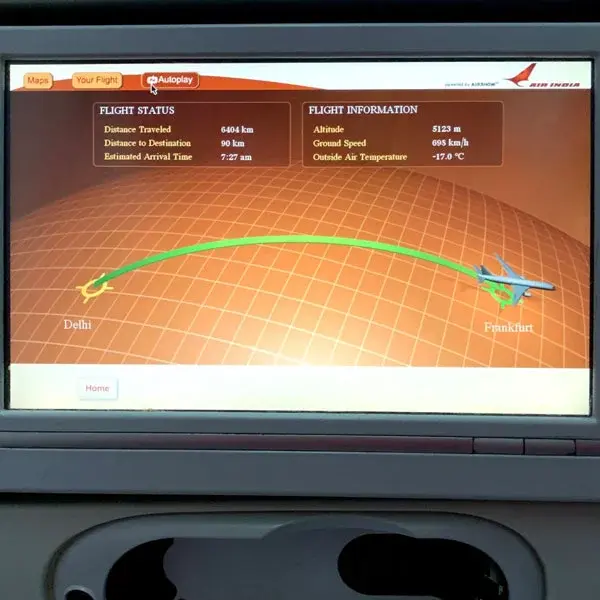
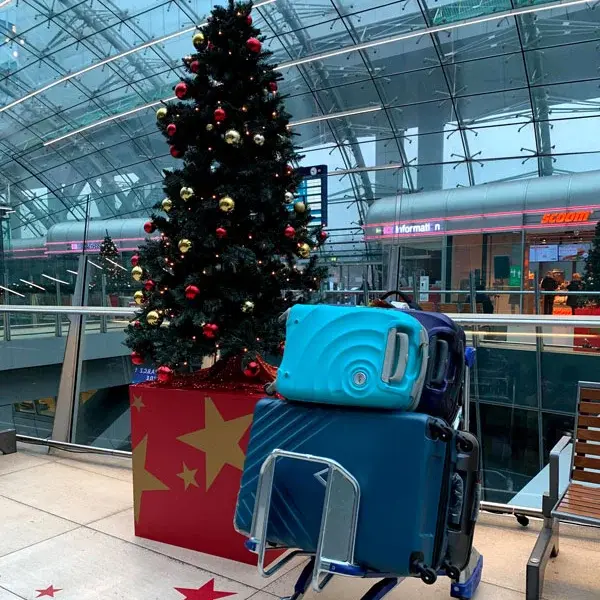
Long queues of masked passengers made me more anxious. I hadn’t seen so many people huddled together in nearly 10 months. The ground staff tried to maintain social distancing but in vain. Eventually after a long wait, I made it to the boarding counter. There, I found that my bags weighed a couple kilos more than the stipulated weight, so I tried a hack I had seen on Instagram a few weeks prior, supporting my bags by lifting them a few centimeters with my sturdy boots, while they were on the weighing scales. After completing immigration and all the other formalities, I boarded my sparsely populated airplane. To my relief, I had the entire row of seats to myself. I fidgeted with my screen for a while, looking into the distance, time and maps, taking occasional naps, landing in Frankfurt via Delhi. The fact that I was so out of my comfort zone didn’t sink in till I failed to read all the German sign boards and after a lot of hits and misses, booked myself on a train to Erfurt, my final destination. I’d install the Google translator app much later.
I meandered out of the waiting hall to take in a fresh whiff of this new country that would be home for the next two years.
It was a long wait before the train arrived, so with my bags loaded on a rented trolley, I walked around the airport — lavishly decorated for the upcoming festive season. I meandered out of the waiting hall to take in a fresh whiff of this new country that would be home for the next two years. Only I had forgotten how toasty the general indoors are here. I was met with a piercing gust of wind, numbing my fingers in less than three seconds. I went back inside, layered up and walked to the train station for the last leg of my journey.
Firstly, I couldn’t figure where the train numbers were written, most of it was German anyway. Then there was transferring five bags inside the train, rolling them across the corridors to find a storage space. I was already so tired from a couple of sleepless nights. Therefore, soon after tucking away my suitcases and locating a seat, despite my best efforts to keep my eyes open to see the passing landscape, I dozed away immediately.
I was startled into consciousness by a loud, angry voice. I had stored my suitcases incorrectly. They were rolling all around the bistro car. The manager was giving me an earful, in German, pointing angrily at my bags. I asked her where I could store them, trying to explain my situation while looking helplessly at her co-server, who had a hint of pity for me. She said she could accommodate me till the train manager came in. Within five minutes of conversation, the train manager walked in, as I feared the worst.
Only, on assessing the situation, the train manager helped me transfer my bags to another compartment and created some storage space there. She then pulled out her phone and while pointing at the map on her phone, asked me where I was headed. She then advised me in her broken English to bring out my bags at the gate, 15 minutes ahead of my scheduled arrival. Precisely 15 minutes ahead of my arrival time, she came back for me, and helped me keep them ready for de-boarding near the gates.
Not to come across as rude, and sincerely grateful to her for going out of her way to help me out, I offered to pay her a tip. She politely declined.
It was already my second sleepless day, and my brain was shutting down.
I arrived at my student dorm later that evening, and learnt another lesson on Germany’s work ethics. The entire staff including the caretakers was on leave, leaving me and my bags stranded until the subsequent Monday. There had been a miscommunication, and now I didn’t have my room keys. I was told there was no possible way to get in touch with them till Monday. The hotels or any mode of rented accommodation would be closed for business because of the pandemic. Before I could panic, one of my batchmates offered me their couch and some hot dinner. It was already my second sleepless day, and my brain was shutting down. I stayed put on the couch in one corner of the apartment over the entire weekend, to reduce any chance of possible infection.
Arriving at the new home
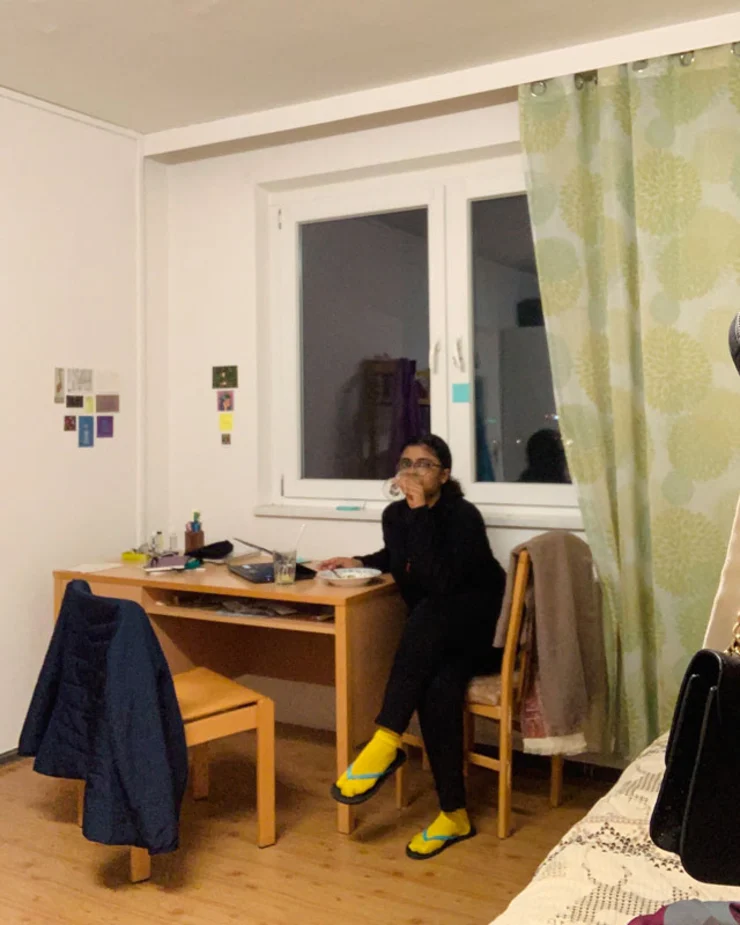
Subsequently, I received my key in a sealed envelope addressed “Frau Singhania” at 11 am on Monday morning. With my bags dragging behind me, I reached my dorm room. I assessed the apartment, and learnt that I was to share the facilities like kitchen and toilets with three other students in my dorm. After having my own space over the last few years, I was not quite used to living in a shared apartment. I was also aware how easily things could go sideways, and had signed my contract for the apartment for the whole semester.
I unpacked, made my bed, and taped photos of family and friends on the walls, simultaneously mentally preparing for a week-and-a-half long mandatory quarantine. The first few days were exciting, but occasionally I would spiral into loneliness. With my limited culinary skills, all my food preparations began to taste the same. By the time I had finished my meals and washed my dishes, it was time to cook again. The monotony of quarantine that I didn’t have to go through all these 10 months finally began to sink in.
It would still take me a while to fulfill basic necessities like buying a sim card, opening a bank account or just visiting a grocery store by myself, but things started becoming more familiar. I would go out looking for bookstores and warm clothes, walking around markets decorated for Christmas. I also grew closer to my flat mates, as we started sharing meals and exchanging recipes. Instead of preparing separate meals, we would prepare one and fortunately, they would now taste different.
Within three weeks of my arrival, another lockdown was declared in Germany to limit a surge in COVID cases during the holiday’s season. But things didn’t appear as grim since I had a tiny support system around.
Today
It’s been nearly six months since I first moved to Erfurt, I am three weeks into my second semester. Over the semester break, I enrolled in an intensive german course, so I could read notices at tram stations and know what shampoo to buy for my wavy hair. I have still not met all my batch mates. In a pre-COVID scenario, according to popular culture, we’d have met in large groups over drinks and wild parties. But now, we meet one-on-one, sometimes when they’d offer to assist with my bureaucratic work that requires German speaking skills, accompanying them as they walk their dogs or hiking in the woods on snowy days. We play table-tennis at the slightest rise in temperature, and eat pizzas when it rains, waiting for non-existent spring weather to arrive even in May. The sun sets at 9pm here, which my brain - developed in India - just cannot process. A few days ago, we went for an anti-racism protest where a classmate held me tight when I told her I was feeling anxious. I had my first meal at Mensa last month, I am still getting used to their peculiar selection of meals. But there’s a kind staff who don't rush me as I struggle to read the displayed menu written in german, and instead they add some extra toppings occasionally. A single key gives access to 6 different doors in my dormitory building and the windows open two-way, but somehow I am always drowning in a bathtub full of physical mails, and the coffee places don’t accept digital payment. My heart sinks on some days hearing about the escalating number of covid cases back in my home country, and so when I lock myself in the room for hours, my flatmates knock on my door and offer me a piece of cake. I sometimes still forget to carry change to rent a cart at Kaufman, but I have finally learnt how to separate my trash and recycle them.
I realise how much I have grown.
Slowly, but steadily, we are familiarising ourselves with each other, this new country, its language, rules and culture in rather unconventional ways.
When I was asked to write this piece, I wasn’t sure how my experience would add up, but while writing and thinking and writing some more, I realise how much I have grown and experienced a wide spectrum of emotions over the last six months and many, many lockdowns and curfews before and since then. I am sometimes filled with an overwhelming sense of not belonging, of imposter syndrome, but I am also reminded of a quote I read somewhere that — existence is rebellion — and so, I go on with my day. Although, I must admit, the internet is not great here either, but hey, the automatic doors everywhere!
